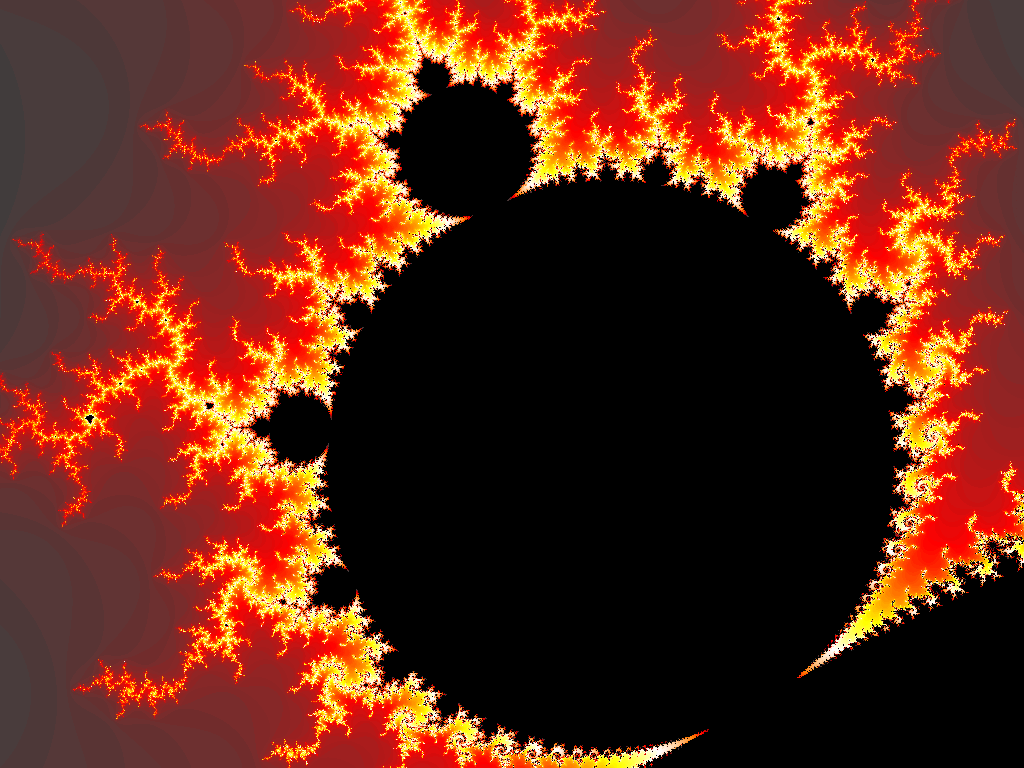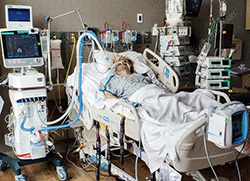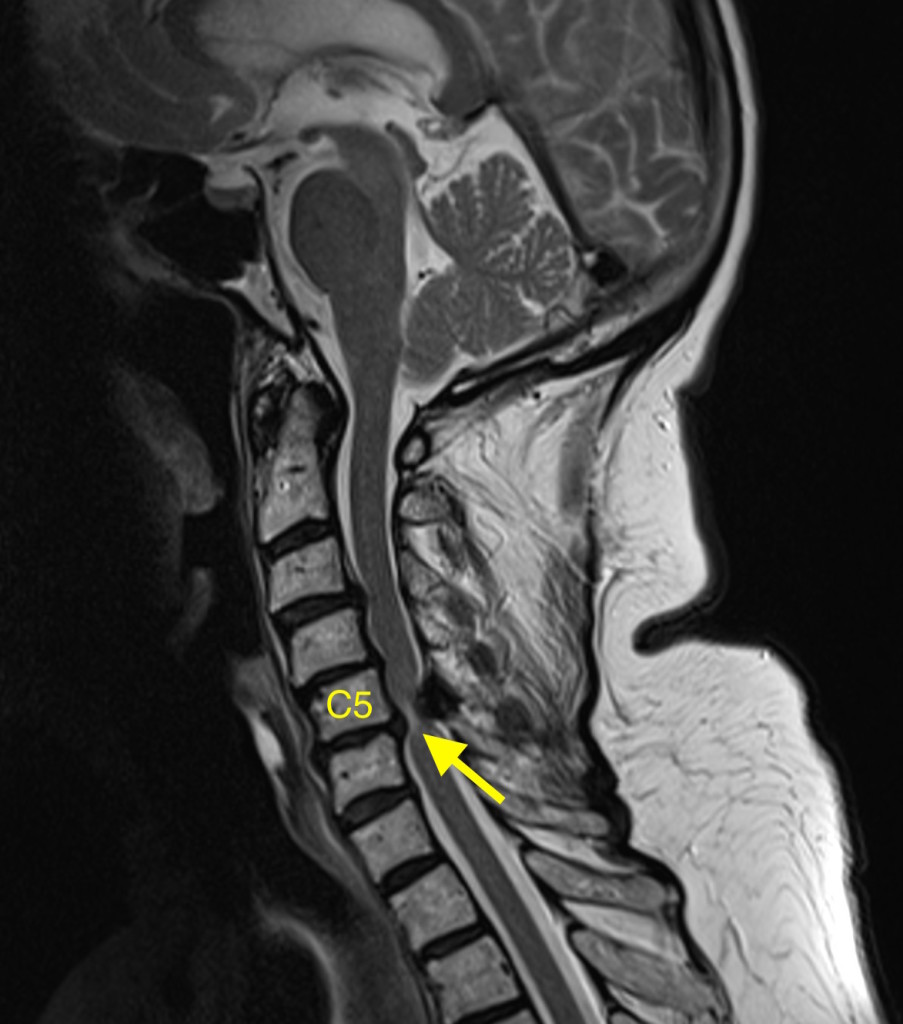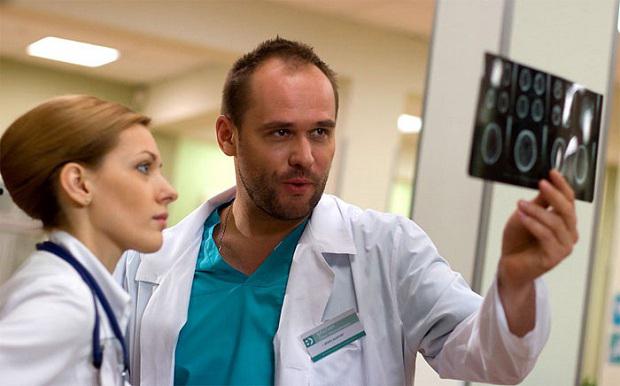|
Pain. God awful searing pain that fills the body like the clap of a bell. Pain, engulfing the senses in endless echoes of despair. How do you explain the screams of pain in the echo chamber between life and death - the infinite silence that is too loud? Pain in every waking and non-waking moment, a silence too loud to bear. "You're lucky you were in such good physical shape," came a voice through the echoing silence. I didn't recognize the voice, but it was a warm song in the sea of oblivion. "You'd never have survived if your heart hadn't been so strong," came the sound again. It was Alice, my buoyant intensive care nurse, whose voice was the first to cut through the morphine stupor. I was in a dim room, illuminated only by the phosphor glow of medical instruments whose green traces beat out the rhythm of a life on the razor edge of eternity. I felt like a small cold planet drifting in a dark and lonely universe.
"You've been here for three days. You're in intensive care at San Francisco Affordable Medical Hospital." "What happened?" "Well, you would be the last to know! Why, some crazy woman decided she just didn't like you and put a bullet an inch from your heart. You were in surgery a long time. Damn illegal guns, outlawing them didn't help a bit!" There was more sleep and more pain and dream hallucinations of my death colored in black, orange and yellow with a palette induced by cheap Oxycontin and morphine knockoffs and a witches brew of who-knows-what other chemical painkillers. "Patients may suffer agitation, delirium, headache, convulsions, gangrene, scabies, and/or hyperthermia" you could just hear the mandatory FDA disclosures. I drifted in and out of a stupor, sometimes on my own, sometimes after being probed and prodded by the medical staff. "Can you feel this?" "No." "How about now?" "Still no." "What about . . ." "Damn! I'm not a pin cushion! Leave me alone!"
I understood I was damn lonely here in this shell of a body and that I wanted to let go, to just drift away into a cold silence where there is no pain. But I wasn't done with my time on Earth, that's something God decides. "Poor devil never knew what hit him." "They never did find the woman who shot him." "He'd have been better off if they'd let him die." It was the last sentence that stuck in my mind like a thorn, pricking the kernel of being that is life itself. They didn't know what was best for me. They couldn't see the worlds that lay waiting to be conquered by me and me alone. By God almighty I would refuse to allow them to hold my life in their hands. My fate wasn't the property of a bunch of medical technicians, it was mine to decide and I knew damn well I hadn't yet fulfilled my time on earth. "Here, take these pain pills, they'll help" Alice tried to soothe me late one night when the sweat poured off my forehead in icy rivulets and my heart pounded with fear. "Go to hell, Alice," I gritted through teeth clenched tight. "Take your pills and go to hell!" "It's about time." Alice said quietly. "I thought you'd given up. You'll do fine now, Steve, you'll do just fine." On the fourth day, I was moved from the icy sterile white of intensive care to the dirty peach boredom of a filthy ward. It is too expensive to coddle high risk terminal patients I was told. My neighbour was an old Hungarian ex-gymnast who'd bribed doctors to have his back fused; he mumbled incoherently about having had better medical care from the communists in his youth. In my own few lucid moments, squeezed between waves of pain, my eyes traced the pebbled moonscape valleys of the water stained ceiling, vainly searching for a way out of this hell. It wasn't until the eighth day that I started to receive
visitors in any coherent way. Oh, my parents and friends had been
trooping by regularly and had left a rainbow of flowers and risque'
get well cards, but I hadn't been able to do more than mumble back
to them. Besides, it took a while to get used to what Dr. Freeman,
the staff neurologist had to tell me after he'd prodded me into
consciousness. "Steven, you took a bad hit from someone and I'm not going to mince words." So strange to be addressed as Steven, as though I were a little boy. I'd become used to Steve or Professor or even Dr. Heller, but now I was a helpless child. "Get on with it, I just want to know when I can get back to work." "Well Steven, you've got a bullet lodged against your spine, Cervical 5, and in our best judgement and the judgement of the National Health Service Medical Panel, it would be cost ineffective to operate. We think if the bullet is left alone, you might regain some minimal feeling and functionality in your lower body. But as for walking again, it's just not in the cards." A cliche', a bullet in the spine, something that occurs to ghetto people after a drive-by, not me. "I thought you guys had miracle drugs for this," I mused hopelessly. "Stem cells, electrical fields . . . So when can I go back to work?" I repeated determinedly, ignoring the doctor's evaluation. "If I were you, I wouldn't worry about that for a long while. I'm afraid National Affordable Health Care doesn't allow stem cell implantations for non-terminal patients. And you don't have Essential Occupation Status. It wouldn't matter anyway, you'd be risking your life." "Risking my life?" I sputtered, what did this stupid ass know about risking one's life? "It's a risk not to take risks! If I lived like that, all I'd have is the shadow of what might have been!" That's what I thought I said, but I'm sure it was just an wild-eyed incoherent babble. "You are a very selfish man", Dr. Freeman huffed as he walked briskly away. "We have more important people in the health system to worry about than just you. You should consider voluntary euthanasia, it is quite humane" Freeman was certainly right that I wasn't high on the Essential Occupation Status list of politicians and union leaders whose lives were deemed indispensable. I later found that Dr. Freeman was a People's Deputy in the California region and knew the rules. But What Dr. Freeman didn't understand was that I had work to do that was damn important. What my colleagues at the university thought of as my art work, the pretty fractal creations that traced themselves on my computer screen in scintillating colors, were the outward manifestation of something much more profound. "Fractal compression schemes," I told everyone. But what I was designing was an evolutionary matrix within the transistors of the SuperGrid network, my supercomputer of supercomputers. On the edge between the mechanical and the sublime, I was sure that matrix had a purpose and a soul and I couldn't let it die with me. But that thought begged a question. Outside the close knit academic community that followed my work on evolutionary fractal modeling, I was a non-entity. I had no interest in any of the trivial political stews that had excited the masses to frenzy - ethnic wars, religious jihads, gender revolution, green utopia - those were not my concern. Why in heaven or hell would someone want to kill an innocuous computer hacker like me? A police cadre sergeant from the San Francisco Department of Homeland Security showed up about the tenth day to ask me that same question. The sergeant had been by earlier, right after the shooting in fact, but the pain I was in erased my memory of what was said - I doubt I was coherent. I do remember the interviewing SFPDDHS detective sucked Marlboros like a robot - only police Dicks could ignore with impunity the anti-smoking crusade by Mothers Against Secondhand Smoke. Not every Joe Sixpack could rate a Marlboro, the masses had to make do with the government's Hawaiian Gold reefer monopoly to appease their smoke addiction, about the only positive source of civic tax revenue the Feds had left beyond printing Greenbacks.
"We haven't been able to trace Sapphire James, the woman who put the bullet in you." Sergeant Dillon, the square jawed bulldog from the San Francisco DHS department stated politely but coldly, dangling a glowing smoke from his lips. How he'd survived the politically correct SFPDDHS bureaucracy purge to become a DHS dick must have been a union thing. Once the Federal government federalized what was left of the defunded police departments, COPs were the last people you wanted to deal with. "What's so unusual about that," I wisecracked. "I don't think you guys catch a tenth of the murderers . . ." "Look, I'm just doing my job." Dillon cut short my soliloquy, he'd heard it all before. "What kind of connection did you have with Sapphire?" "What do you mean by that? Sapphire who?" "Don't play stupid, wiseguy. Sapphire, the hoe who shot you. She's been known to turn tricks down in North Beach when the work was slim for comediennes." "Get off it. I never met the woman before." I said as forcefully as a quadriplegic could. "So how does a college professor get himself shot pointblank in the middle of a crowd without anyone knowing why?" Dillon continued to grind. "You sure there's not some sort of love triangle going on here?" "Get out of here!" I spit back. "I'm not in the habit of letting myself be hustled by prostitutes and I haven't . ." I started coughing up some blood and the detective called the nurse. Sergeant Dillon left convinced I'd pissed off some two-bit whore and she'd taken a nickel shot at me. End of story, go get a doughnut and tell the boys down at the station he'd solved another one. But it wasn't as simple as that. I didn't have a clue why Sapphire James, or whatever her name was, would want to try and send me to an early grave. I was a recluse and hardly had any friends - just no time for anything social other than social media. I sure didn't think I had any enemies. I suffered through the obligatory visits of my mother, Ada, who sat by the bedside in tears. She tried to keep my ward area clean in what were decidedly third world conditions. She and my father Burt were taking things hard; nothing was said, but you could feel it in the air. I was no longer their son, but a pathetic basket case from whom all dreams for the future had been erased - the way a grade school teacher would erase the lessons of the day and then turn them to dust by beating them against the wall. "I'll be fine, Mom," I kept reassuring her, but she was turning old before my eyes. Visions of grandchildren had disappeared. My mother began treating me like an infant who couldn't care for himself; I sensed she would never let me out of her sight again. It was humiliating, like returning to the womb. But my parents were right, I was no longer a man but an object and the depression started to set in. Even in my sorry state, I felt worse for my dad Burt. He'd been through hell the last decade after he was Unpersoned and driven out of his EPA environmental engineering job for speaking up. He was a broken man and now he had to watch his son turn into a vegetable. Then there was physical therapy, an even more poignant reminder of what I had become. My dad wiped out what little was left of his retirement savings to pay for it, though I didn't find that out till much later. Affordable Care doesn't pay for physical therapy for DNR non-beings. Once you are scratched from the database of the living, it's like you don't exist. "You've only got minimal movement in your arms and no motion at all in the rest of your body," Sally, the pretty blonde physical therapist quipped cheerfully as she started the rehabilitation process at bedside. "Your arms will have to become your legs! Got to keep you moving so you don't get those icky bed sores!" "I'm going to walk again," I insisted, but I saw Sally was checking me off in her mental exam book as having entered "the denial" period of my illness. So clinical, so wrong, I swore I wasn't going to give in to it! "We'll see," Sally replied condescendingly, but with a pert cheerleader smile. "We're going to start you down at the pool in a couple of weeks, but right now we need to keep you limber!" My legs would shake in useless hyperactive spasms when Sally stretched them out, moving them through a range of motions they would likely never again execute of their own volition. "Maybe there's some life in the old legs yet," I'd clench through my teeth as painful contractions jerked my limbs like a spastic marionette out of control. Aberrant signals from the few sensory endings still left intact would race up and down my devastated spinal cord and rack me with excruciating pain. "I don't want to get your hopes up," Sally promised. Funny, but she didn't get my hopes up at all. It wasn't until the fourteenth day after the accident that Liddy showed up. She came alone, we'd been close friends. I didn't feel too disappointed that the two others who'd witnessed my shooting did no more than send Hallmark Get Well cards complete with bucolic verse. Liddy's boyfriend Bruce, the biogenetics grad student, was a loner like myself. Shelley barely knew me and couldn't be expected to get too attached - she was more involved in Pink Revolution marches for the displaced women of Uruguay anyway. "Hi." Liddy said. Then she sat there and cried for ten minutes. "How are you doing, Steve, " she finally composed herself enough to ask. "As you can see, not very well, Liddy," I deadpanned. "I don't think I'll be going to any concerts with you very soon." We both laughed, a little weakly but it broke the ice. Liddy was my best friend at the university, she was secretary to the computer science department. Slim, dark haired, pert and twenty-five, she was hopelessly addicted to the modern art department where she took graduate courses in the creation of multi-colored fiberglass monstrosities. Our friendship was platonic, her tastes ran from Aphrodisiac to Zodiac. Mine ran from Amadeus to Z-Transforms. "I can't believe what happened, it doesn't make any sense at all." Liddy continued. "You're a teddy bear, Steve, anyone who would try to kill you must be completely nuts!" "So you think this was a random shooting and this Sapphire James gal is crazy?" I asked. Liddy hesitated. "No, I'm sure she's as sane as you or I, and that's what disturbs me." Liddy answered carefully. "This Sapphire had a look of intelligent calculation in her eyes when she came across the floor and shot you. As if she knew you! She even called you an assassin!" "I've never seen her before in my life!" "Well, that's not what the academic news-blogs twittered," Liddy hinted. "There was speculation Sapphire James is your paramour." "Get off it Liddy. You of all people should know I'm attached to my computer with a 8G umbilical. When would I have time to fool around?" "Well, I feel pretty stupid, Steve," Liddy admitted. "I thought there might be something to the secret lover story. I was hoping you were leading an exciting secret life on the side!" "Sorry to disappoint you, Liddy. I'm just an unknown lonely hacker." "That's not what those Federal Reserve and Department of Defense investigators said a year ago. Remember, I was the one who had to cover for you. They said you were world famous! And dangerous!" "Dangerous!? I try not to remember that incident." I squirmed uncomfortably, as much as a paralyzed lump of flesh can squirm. "I think they just had questions about a grant application," I lied. I'd published a paper on fractal encryption techniques that had gotten caught up in the national security laws against unbreakable encryption codes. Something about illegal Freedom Networks spreading misinformation and using my techniques to funnel e-Money around the world in some nebulous anti-tax monetary fraud. I thought they'd crushed the Bitcoins illegal e-money movement long ago? After China’s central bank declared all transactions involving Bitcoin and other virtual currencies illegal, blocking use of unofficial digital money, other countries took the same course over time. China had complained Bitcoin, Ethereum and other digital currencies disrupted the financial system and were used in money-laundering and other crimes. “Virtual currency derivative transactions are all illegal financial activities and are strictly prohibited,” the People’s Bank of China said on its website.I respect America's anti-cryptocurrency laws, but I can't be responsible for what people do with my software, any more than Ann Rand was responsible for the Atlas Shrugged movement that led to the Going Galt revolts. Information has no morals, it is dangerous only in relationship to who is using it and for what purpose. People using encrypted money wasn't my idea originally and I didn't see how it could be a threat to state security. The American legislation that mandated cyberbrokers collect names, addresses, and transactions of customers every company even tangentially related to cryptocurrency forced the brokers to surveil their users - so cryptocurrency was driven underground before my encryption techniques were even invented. And I wasn't sure how a private entity like the Federal Reserve had gotten police powers to interrogate me on security matters anyway. That was my official version anyway, and who knows, there might even be some truth to it. The DoD investigations may even have had more to do with the ongoing battle of the National Department of Truth’s enforcement of the anti-misinformation laws than over Federal Reserve interests. Unbreakable encryption allowed people to hide information from Federal enforcement on social media, even after Gaggle, Facely and Twister joined together in the federal Internal Information Service, to run massive search algorithms to ferret out mis-think. Of course, Misinformation can be posted by people, even in good faith. every school child knows Gaggle, Facely and Twister built a government funded global network of more than 8000 independent fact-checkers to address the challenge, who review content in more than 90 languages. When they rate something as false, they logically reduce its distribution so fewer people can see it and add a warning label with more information for anyone who does somehow see it. They found that when a warning screen is placed on a post, 95% of the time people don’t click to view it. At first they notified the person who posted it and reduced the distribution of Pages, Groups, and domains who repeatedly shared misinformation. But people are clever and began to evade the restrictions, even after they were Unpersoned. Some began creating alternative news channels like Rumble and Parler to evade the mis-think. After those were shut down, the insurgents began encrypting their messages and running parallel Freedom Networks. The government claimed these were all White Supremacist Domestic Terrorists, but a lot of homeschoolers used the networks to avoid Critical Race Theory that now made up 50% of the curriculum. That’s where my Fractal Encryption paper came in again, allowing virtual networks to float on the existing infrastructure. Freedom Networks, apparently, but how could I have predicted that? The government and the corporate Truth monopolists were hard to distinguish anymore. I didn't have a dog in any of those fights, I believe fervently that the government has the duty to censor crazy speech - I'd be crazy not to believe that or my research and books would be banned. No, I'm just into my fractals. "They asked me to put a backdoor in my algorithm so the government could get into my fractal equations," I informed Liddy frankly. "But I said I wouldn't and they left me alone. So, that's not what this is all about Liddy." "Then what is it about, Steve?" "You know, right now I don't know and I don't care. All I want to do now is get back to the SuperGrid computing center." "That's where I've got some bad news for you," Liddy squirmed, it was now her chance to be uncomfortable. "Dr. Huang, your friend from biomathematics has taken over your duties as head of SuperGrid. He felt it was the right thing to do for you, as a friend and colleague." "God, you might as well drive a stake through my heart!" I exploded. "Huang used to be my friend and this is how he stabs me in the back! You'd think the SuperGrid Committee would at least have had the decency to wait till I got out of the hospital before they moved someone into my position!" "Well, your doctors didn't think you'd make it Steven. Dr. Huang has been like a brother to you; I'm sure he was trying to act in your best interest and . . . . ." "That's a cheap damn excuse Liddy and you know it! Didn't anyone stick up for me?" "I did, but I'm only a secretary. Simonton from mathematics put in a good word and Cardle from mechanical engineering stalked out of the meeting in a huff. I'm sure if you find a way to come back, I mean when, this will only be a temporary promotion for Dr. Huang. . ." "You don't lie very well, Liddy." I said with a sinking feeling. "Huang's been fighting behind my back for my position as head of the Supergrid for the last year. That damn ingrate will never give up the post even if it is temporary and even if I came back tomorrow." "I'm sorry," said Liddy. "I know you are. Thanks." And Liddy left, with a promise to come by in a few days. Qin Shi Huang- Huang for short - and I had become friends first when we were graduate students and later after he came onto the faculty at the California Institute five years ago. He could have been an intimidating friend to have, he was the son of a Hong Kong billionaire who had become influential in the Chinese Communist Party after the island regained its senses and became communist decades ago. But we had our mutual interest in petaflop computing to bind our academic relationship and loose friendship. My only complaint was that he'd become the ultimate computer hog from the biomathematics project – everyone has their passion and he thought his superseded everyone else's. Huang’s group was doing gene sequencing as part of the Next Generation Human Genome Project (NXGEN), the attempt to completely re-model human genetic development and accelerate evolution using DNA maps not only correlated to other species but to our evolutionary past. Knowing the genome of a Neanderthal let you predict the path to the next Superhuman - that was the theory anyway. Huang's projects also focused on the mapping and reverse engineering of viral DNA strands as a way to introduce changes into the genome - Gain of Function research I think they called it. "Viruses are part of our genetic code!" Huang would pontificate at every opportunity. "We evolve through intelligent design of viral automatons!" Some thought Huang brilliant. Some thought he was crazy. I thought he was both, brilliantly crazy, so at first we'd gotten along fine. Three dimensional DNA modeling is complex beyond belief, the programs eat up petabyte blocks of SuperGrid memory and require petaflop speeds. The computer science people like myself hated Kirchov with a crimson passion for slowing even the SuperGrid to a standstill. "Dr. Huang, I appreciate the importance of what you do," I'd spoken to him only weeks before. "But there are other fields of science that need the SuperGrid facilities just as much as you!" "Like who?!" Huang had responded heatedly. "I'm building life with my software while the rest of you morons are engaged in mathematical masturbation!" "Check your ego at the door," I'd replied, less than impressed by this puffed-up academic bonehead. "Your viral microbes aren't the center of the universe. I could make the same arguments for my fractal automatons!" "You'll think differently some day," Huang vowed. "You'll be the first to eat crow." I'd thought of Dr. Qin Shi Huang as a buzzing gnat a few weeks ago, but now the academic tennis match between us was over and I'd been beaten by default. I'd never regain my position at the university even if I miraculously recovered from my paralysis. Huang would turn the SuperGrid facilities into a laboratory for recreating the common cold in software. And he called that creating life. As abruptly as that, within the space of two weeks my whole life had been inverted, control had evaporated and I was set adrift without purpose. Where in the name of heaven and hell was I to find the courage to go on? Liddy had placed a gift on my bed near my head when she left the hospital, a small package in a brown bag. I tried to fumble it open with my teeth and nerve dead arms, but I only flopped about impotently. I wanted to show I wasn't completely helpless, but finally gave up in frustration and called for Jamie, the West Indian orderly. "Look what you got here," Jamie told me in a delightful Jamaican lilt after he unwrapped the small package. "Pure gold!" It was a MemChip recording of West Coast Blue and the pop singer Laura Silvan. Mom had brought me an IPhone Omega 3D virtual music-vid player, and a terrabyte of ancient Billy Graham Holy Roller sermons. I had Jamie que up West Coast Blue instead. I kissed the lips of death a while ago And all of time, she moved so slow . .
. . There was Laura Silvan in my mind again. I envisioned her as I'd seen her at the concert with those deep moody eyes piercing mine, calling to me.
Its a hot black night When there ain't no one loving you Its a hot, hot black night When they ain't loving you . .
. "You're not kidding, Laura" I said out loud again, agreeing to the depths of my heart with the words she was singing. "Turn dat gotdam ting off!" My Hungarian roommate muttered
through the curtains, but I ignored him. |

 "What
day is it?" I croaked. "I feel like a garbage truck rolled over me.
Where the hell am I?"
"What
day is it?" I croaked. "I feel like a garbage truck rolled over me.
Where the hell am I?" But
through the haze I began to catch bits and pieces from the
disembodied voices around me. They talked as if I were a sack of
potatoes and couldn't understand, though I listened intently. I
understood I was paralysed from the neck down. I understood I would
never walk again. I understood I was breaking the Affordable Care
budget and a death panel had coded me "Do Not Resuscitate".
But
through the haze I began to catch bits and pieces from the
disembodied voices around me. They talked as if I were a sack of
potatoes and couldn't understand, though I listened intently. I
understood I was paralysed from the neck down. I understood I would
never walk again. I understood I was breaking the Affordable Care
budget and a death panel had coded me "Do Not Resuscitate".
 A new smell of a stale cigarette warned me that the DHS Dick Tracy
had returned.
A new smell of a stale cigarette warned me that the DHS Dick Tracy
had returned. "You're going nuts, Steve," I told myself out loud. "The rhymes of
a stupid rock star can't save you now." But Jamie left the recorder
on as he exited the room.
"You're going nuts, Steve," I told myself out loud. "The rhymes of
a stupid rock star can't save you now." But Jamie left the recorder
on as he exited the room.